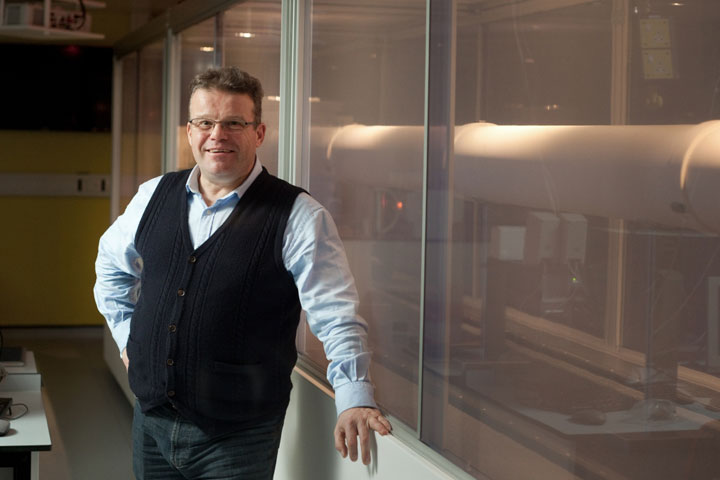How Science Benefits Refugees and Refugees Benefit Science

About this in-person event
For the last 5 years we have been working closely, and then remotely, with refugees in the UNHCR Azraq & Za’atari camps, developing hydroponic horticulture to improve nutrition and well-being. The refugees’ legal status usually prevents them from taking up employment, owning property or moving freely, stripping them of agency. At home, they were farmers, engineers, teachers, doctors, so not only have they been forcibly displaced, but also forcibly unemployed. And they can’t do anything that even looks like it might lead to permanence, like getting a job or fixing their house. It is incredible to see the resilience of the Za’atari folk.
Our research on hydroponics is focused on 1st world technology, the production of high-value crops close to market with a low carbon and water footprint using polyurethane foam as a synthetic soil. This then moved on to understand the complex bio-interactions and systems engineering to build efficient processes.
So there'll be plenty of science in my talk.
We connected our work on synthetic soils with a waste disposal problem posed by UNHCR - the UN's refugee agency - they saw dirty unused mattresses, we saw an alternative growth substrate and more than that; ‘a problem’ could actually help. In doing so, we developed small-scale hydroponics at the household and community scale. There are benefits that come from the act of co-creation, not ‘smart ideas’ parachuted in, and the equality found in some academic humility and what happens between people when safety is taken away. We responded to the frequent cry of the Syrian refugees - that they miss the colour green - not only did we find a technical fix together, but a chance to improve wellbeing too. These benefits are now impacting our work in Sheffield, we now have an urban farm programme, built using the low-cost technology developed in Zaatari with farmers from Syria.
The Covid19 pandemic affects the whole world and back in March 2020, we were contacted by UNHCR for help with PPE and hand hygiene. In both the UK and Jordan we have made prototypes of masks, shields and gowns using digital printing and sewing capabilities and there have been co-created innovations in both design and joining technologies. We are now running a remote interdisciplinary co-production project, comprising a socio-technical part focused on designing PPE and hand hygiene solutions for impoverished refugee camps and the host community, and socio-behavioural part, understanding how the availability of PPE affects people's attitudes and behaviours around risk, and so enables them to address health threats.
The people we met embodied values that are often forgotten by those of us in more privileged parts of the world: an adaptable approach to solving problems, an aversion to waste, a sense of community. As hard as we must work to live in a world where no one is forced to flee their home, there is much we can learn from Syria’s refugees.
About the speaker
Tony Ryan is the Professor of Physical Chemistry and Director of the Grantham Centre for Sustainable Futures at The University of Sheffield. He was Pro-Vice-Chancellor for the Faculty of Science from 2008 until 2016 and previously the ICI Professor of Physical Chemistry, Head of the Chemistry Department and Director of the Polymer Centre.
His research covers the synthesis, structure, processing and properties of polymers and their use in a wide range of applications including energy capture, wound healing, drug delivery as well as paint, soft-furnishings and packaging. He has co-authored more than 300 papers and has an H-index of 82. His 1998 text book, with Arthur Wilkinson, on polymer processing, is used world-wide. In 2014 he published a book on sustainability, “The Solar Revolution”, co-authored with Steve McKevitt, a social scientist, and it has had great reviews; it puts into context how we come to live on a planet supporting 7 billion people and what we have to do to make sure it remains inhabitable (and prosperous) for the foreseeable future.
Tony presented the Royal Institution Christmas Lectures on Channel 4 in 2002 and is a regular contributor to TV, radio and newspapers. He was born in Leeds and got his three degrees from UMIST. Married with two daughters, Tony is a creative cook, a keen cyclist and an occasional mountaineer and skier. He was made an OBE in 2006 for ‘Services to Science'.
About The Cantor Technology Lecture Series
In 2015, our former Vice-Chancellor, Professor Brian Cantor initiated the Cantor Technology Lecture from a personal endowment made annually to the University. Professor Cantor stepped down as Vice-Chancellor of the University of Bradford in 2019 but we are continuing with this as a legacy lecture.
The Cantor Technology Lecture seeks to bring to the University a distinguished academic or leading industry expert, to deliver an annual lecture in the field of technology.
